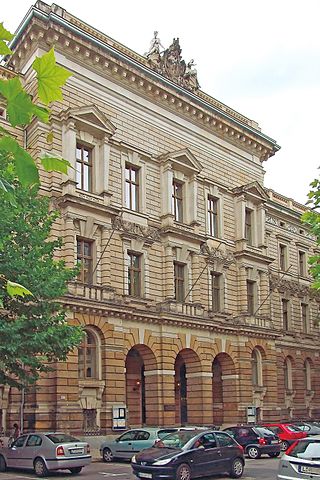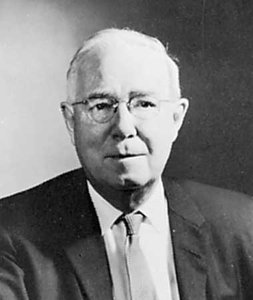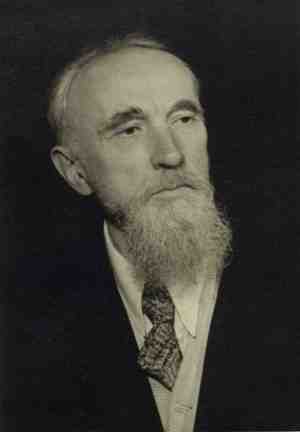Related Research Articles

The University of Music and Theatre "Felix Mendelssohn Bartholdy" Leipzig (German: Hochschule für Musik und Theater "Felix Mendelssohn Bartholdy" Leipzig) is a public university in Leipzig (Saxony, Germany). Founded in 1843 by Felix Mendelssohn as the Conservatorium der Musik (Conservatory of Music), it is the oldest university school of music in Germany.

Leo Salkeld Sowerby was an American composer and church musician. He won the Pulitzer Prize for music in 1946 and was often called the “Dean of American church music” in the early to mid 20th century. His many students included Florence Price and Ned Rorem.

William Ifor Jones was a Welsh conductor and organist. Born into a large coal-mining family and raised in Merthyr Tydfil, Jones studied at the Royal Academy of Music as a scholarship student in London from 1920 to 1925. He studied the organ with Sir Stanley Marchant at St. Paul's Cathedral, London; orchestral conducting with Ernest Read and with Sir Henry Wood, ; and harmony with Benjamin Dale. He was for a time organist at the Welsh Baptist Church in Castle Street, London, worked at the Royal Opera House, as a vocal coach at Covent Garden, assisted with the British National Opera Company in the role of prompter, and was the Assistant Choir Master at St. Paul's Cathedral, London.
Henry Wellington Greatorex was an English-American musician.
Frederic Lord was an English choral conductor, organist, composer, and music educator.
Conrad Bernier was a French-Canadian organist, composer, conductor and teacher. For many years he was a professor at the Catholic University of America in Washington, D.C.

William Rhys-Herbert (1868-1921) was a Welsh composer, conductor, organist and pianist. He composed numerous operettas for performance in schools, and also published songs, partsongs, and cantatas.
Hubert Stanley Middleton was a cathedral organist who served at Truro Cathedral and Ely Cathedral before taking up a long-standing organist and teaching appointment at Trinity College, Cambridge.

Bruno Siegfried Huhn was a British-born American composer, voice teacher, vocal coach, pianist, organist and conductor. Born in London, Huhn trained as a pianist privately and studied music at Trinity College London. He was active as a concert pianist in London and the British provinces from 1881-1889 before embarking on an international concert tour in 1889-1890. After spending some time in Australia at the conclusion of this tour, he returned briefly to England in June and July 1891 and moved to New York City immediately after this. Soon after he became a naturalized American citizen and the remainder of his career was spent in the United States, principally in New York City. There he was active as a church organist and choir master, choral conductor of community choirs, composer, and a highly celebrated vocal coach and voice teacher. Several of his vocal students became principal singers at the Metropolitan Opera. At the time of his death, The New York Times said he was best known for his musical setting of W.E. Henley's poem "Invictus".
William Henry Hewlett was a Canadian organist, conductor, composer, and music educator of English birth.
George Alfred Lynn was an American composer, conductor, pianist, organist, singer, and music educator who was born in Edwardsville, Pennsylvania and died in Colorado Springs, Colorado. A longtime member of the American Society of Composers, Authors and Publishers, his compositional output encompasses more than 200 orchestral and choral pieces; many of which have been performed by major American symphony orchestras like the Denver Symphony, the American Symphony Orchestra under Leopold Stokowski, and the Philadelphia Orchestra. He taught on the music faculties of several prominent American colleges, notably conducting several university choirs. Throughout his life he was active as a conductor, organist, and pianist for various church and community choirs.

Alfrēds Bruno Jānis Kalniņš was a Latvian composer, organist, pedagogue, music critic and conductor; the founder of national Latvian opera. Kalniņš is primarily remembered for his national opera Baņuta (1920).
Robert Hart Baker was an American symphonic and operatic conductor
Professor Martindale Sidwell FRCO was an English organist, composer and teacher.
Raymond Hughes is an American conductor and choral director.

Cassius Clement Stearns was an American composer of church music. He was born on 23 August 1838 in Ashburnham, Massachusetts, the youngest child of Charles Stearns (1796-1874) and Rebecca Green Stearns (1802–87). He married Gertrude Bottomly (1837-1910) of Leicester, Massachusetts, in Boston on 23 October 1872, the celebrant being the Revd. Phillips Brooks. Stearns died on 7 August 1910 in Sharon, Massachusetts and is buried at Worcester Rural Cemetery, Grove Street, Worcester.
William Richard Pybus was a South Australian organist, pianist and music teacher.
References
- 1 2 Slonimsky, Nicolas; McIntire, Dennis (2001). "Florio, Caril (Real Name, William James Robjohn)". In Kuhn, Laura (ed.). Baker’s Biographical Dictionary of Musicians . G. Schirmer, Inc.
- 1 2 "Caryl Florio Dead, In Real Poverty". The Buffalo News . November 22, 1920. p. 15.